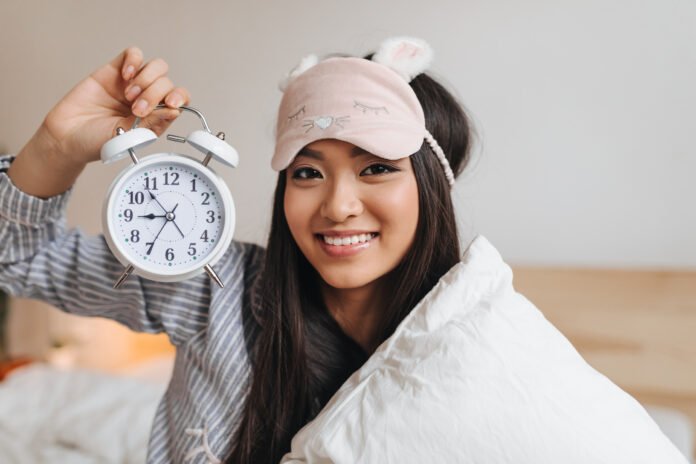Like other mental health disorders, difficulty to fall asleep at night has also become an emerging issue of the modern era. After the corona pandemic, a lot of people are suffering from sleep deprivation. The lack of sleep or low quality sleep is causing severe physical and mental health problems, including depression and anxiety. Although good sleep habits and better sleep hygiene can help you improve your sleep quality, if you are failing to recover your good sleep habits some natural sleep aids like magnesium, melatonin, and valerian root can help you have better sleep. Good quality sleep is an essential need of your body and mind. It impacts your overall health as well.
Overview
Your body and brain both need good sleep for their proper functioning. Having a good sleep at night not only helps improve your learning ability but also promotes skills of creativity, good memory and decision making power.
In addition, insufficient or interrupted sleep is associated with higher risk of obesity, cardiovascular diseases, and diabetes. Although most people understand the importance of sound sleep at night, they still can;t have it. According to an estimate, around 30% of the population in the country is suffering from lack of sleep or symptoms of insomnia. That is not only damaging their physical and mental health but also causing disturbance in their life activities.
Studies suggested that good quality sleep needs good habits and practices. But it’s a reality that some people are deprived of this blessing. They live with low quality sleep that’s not enough for a healthy lifestyle. If you’re one of these people, you may need a little extra help to get a good night’s sleep. You can try any of these 10 natural sleep Aids for better sleep in 2025.
1. Melatonin
Like all other body functions, the brain also controls your sleep pattern and sleep cycle. Different times of a day influences the secretions of this hormone in different ways. Studies show that the level of melatonin production speeds up in the evening and falls down in the morning naturally. That’s why researchers consider melatonin as a natural sleep aid that has no side effects.
According to research, melatonin influences both times of sleep whether it’s day time sleep or night sleep. An older researcher also has also revealed that melatonin supplements proved helpful in regulating sleep cycles in people experiencing jet lag.
In addition, melatonin is considered an effective treatment option for people living with sleep disorders. However, some studies also emphasized that melatonin actually improves your sleep quality by reducing the time you need to fall asleep. This means the hormone actually acts as a relieving agent for sleep latency disorder. It also increases the quality and duration of sleep time. But the research is not enough to verify the theory.
Moreover, more studies should be done to check the effects of melatonin supplements during pregnancy or breastfeeding. The best way to prevent any side effects of melatonin supplementation is to talk to your doctor before taking any supplements while you’re pregnant or breastfeeding your baby.
2. Valerian Root
Valerian root is commonly grown in European and Asian countries, where it is considered a good remedy for relieving the symptoms of menopause, depression and anxiety. This naturally occurring herb is a;so used as a sleep aid substance. According to studies, most of postmenopausal and menopausal females often use this herb to promote their sleep quality. They depend on valerian supplements to improve their sleep disorders as well.
According to a 2019 research, taking around 400 mg of valerian supplements constantly for 30 to 40 days can improve your sleep duration, sleep quality and help prevent the symptoms of sleep latency. Another study involving 49 people who were undergoing hemodialysis found that taking a prescribed amount of valerian root before bed for 30 days continuously showed significant improvement in sleep quality and depression symptoms in those patients.
However, there are also such studies found that concluded that the effects of valerian root on sleep latency are not considerable. They said that it might be beneficial for increasing sleep time but its effects for falling asleep soon are negligible. Doctors suggest a short-term use of valerian root because it causes minor side effects when used continuously. It is true that valerian uses slack objective measurements but adults still use it for sleep improvement purposes. However, long-term use of valerian is not safe in certain populations, especially for pregnant and nursing people.
3. Magnesium
Many body functions including heart health and brain functions need magnesium for their proper functioning. But you will be astonished to learn that magnesium also plays an important role in making your mind and body fall asleep easily. Studies suggest that magnesium regulates melatonin production. That;s why it partly affects the relaxation in your mind and body. Magnesium greatly influences relaxation in your muscles and induces sleep as well. Studies also support the theory that magnesium deficiency is associated with insomnia or other sleep disorders. Thus taking magnesium supplements can help you optimize your sleep quality and quantity. Magnesium is often used solely for sleep promotion but sometimes, it is used in a combination with other sleep-promoting ingredients including melatonin or glycine.
In addition ,many studies suggested that the combination of magnesium with vitamin B and melatonin is the most effective treatment option for insomnia and other sleep disorders. Studies involving older adults found that magnesium supplements help you reduce the time duration you often take to fall asleep.
Moreover, it is also important information about older adults that lower levels of magnesium in blood may cause sleep issues including sleep latency and insomnia. Some studies also found that taking 300 mg of magnesium in combination with melatonin for 2 to 3 months constantly can help improve sleep quality in people experiencing symptoms of polycystic syndrome. However, more research is required to check the exact effects of magnesium supplements on sleep quality.
4. Lavender
Lavender plant is usually used in households in a variety of ways. It is found in almost all countries around the world. It has a soothing fragrance that can enhance sleep quality and quantity. Studies suggested that smelling lavender fragrance or essential oils before bed time can help induce sleep within no time. Another study involving people experiencing dementia a;so suggested that lavender aromatherapy is effective for improving sleep disturbance symptoms. It not only helps increase total sleep time but also help people get back to sleep easily when woken up at midnight. Although lavender aromatherapy is considered a safe sleep aid for better sleep, its oral intake can cause diarrhea, nausea, and belching. Therefore, doctors recommend essential oils only for aromatherapy not for oral ingestion.
5. Passion Flower
Maypop or Passiflora incarnata is commonly known as passion flower. It is considered the best remedy for sleep disorders like sleep latency and insomnia. This sleep improving flower is found in Australia, North America, Europe, Africa and Asia. Several animal studies provide proof that passion flower has sleep-promoting qualities. Another study involving humans has suggested that passion flower tea acts as a sleep inducing beverage. Drinking passionflower tea one hour before bed for a week continuously can promote sleep.
A study involving around 50 people who were taking passionflower tea where the tea bag was allowed to steep for 5 minutes, found that drinking the passionflower tea had positive effects on sleep quality. But another study where people were studied for three weeks to check the effects of passionflower tea on sleep has indicated that no participant was observed with improvement in sleep quality at all. But when they were asked about the sleep quality subjectively, they rated it 10% better than not having passionflower tea.
In addition, a controlled experiment involving around 150people suffering from insomnia, recorded the results that people who took passionflower tea for a 15 days period showed significant improvement in sleep patterns and duration as compared to a placebo. Study revealed that passionflower tea is responsible for improving certain sleep parameters, including:
- The percentage of sleep time as opposed to lying in bed without sleeping.
- Wake time after sleep onset.
- Total sleep duration.
- Sleep efficiency.
All the studies have shown different or opposite results. Therefore, it is still difficult to say an authentic thing about the effectiveness of passionflower tea on sleep. But for now, it is concluded that drinking passionflower tea is associated with improved sleep somehow and more effective than certain sleep promoting supplements.
6. Glycine
Your nervous system is somehow influenced by glycine but the most authentic effect of glycine is observed on your sleep. Studies suggested that glycume have positive impacts on sleep duration and lee quality. Its way of functioning for prompting sleep is still unknown but certain studies expose that it plays a role in lowering down your body temperature at bed time. Lowering temperature is identified as a sleep signal by your nervous system. Thus you want to sleep after taking glycine.
Another 2021 study showed that people taking 5 grams of glycine daily for one week were observed with improved sleep as compared to a placebo. People who used glycine were reported feeling more sleepy near bedtime and more referred near king time. They also told me that they felt more cherishness,lightheadedness and liveliness the next morning after using glycine.
Researchers studied glycine effects on people who were experiencing [poor sleep. Researchers also observed regularity in the breathing rate, heart rate and brain waves in the people who had used glycine. It is also observed that participants fell asleep better due to glycine supplements.
According to a 2015 study, people who took glycine also had observed improved daytime performance especially those who were temporarily sleep deprived.
Glycine is used in the form of powder or pills. It is considered safe to take around 1 gram per kilogram of your bodyweight. But most studies also have shown that taking 2 grams of glycine is also safe and showed no side effects at all.
Increasing glycine intake through the diet is also beneficial for sleep quality. Foods rich in glycine include:
- Kale.
- Cabbage.
- Beans and legumes.
- Spinach.
- Certain fruits like kiwi and banana.
- Animal products such as fish, meat, eggs, bone broth and poultry.
Risks and Precautions
Whenever you come across a sleep problem or sleep deficiency syndrome and decide to improve your sleep by using any herb or OTC, never forget to talk to your healthcare professional. The natural herbs or aids used for improving sleep quality also have certain risks and side effects that can cause some serious nervous or physical complications. Reaching out to your healthcare professional before using any herb or OTC medications for helping sleep improvement help you prevent the potential side effects of these drugs. Moist of sleep promoting medications or drugs can interact with other medicines and lead to thinning of blood as well. If you experience insomnia, hypersomnia or sleep-latency type sleepiness longer than 15 days, talk to your doctor immediately. You are developing a sleep syndrome that can harm your physical and mental health.
However, sleep promoting natural herbs or OTC have risky side effects but sometimes it’s become indispensable for you to have peaceful and uninterrupted sleep. In such a case, follow the instructions of your doctor and take a safe amount if sleep -rooting aid or medication.
Here are some side effects related to these medications or sleep aids. But these side effects have been observed in people who took high doses of sleep inducing medications.
- Melatonin: Causes dizziness, headache, nausea.
- Valerian root: Causes vomiting, diarrhea and nausea.
- Lavender: Causes diarrhea, bleaching and nausea.
- Passionflower tea: Causes confusion, slow learning and dizziness.
- Glycine: Causes abdominal pain and liquid stool.
- Tryptophan: Causes vomiting and nausea.
Moreover, pregnant or breastfeeding people are not allowed to take these sleep aids without the recommendation of their doctor. These people should avoid supplements without complete research on their side effects and risk factors. However, some of these sleep aids like tryptophan, magnesium and glycine are essential for fetal development and growth. Pregnant people should take these during pregnancy. However, always follow the instructions of a healthcare professional about the dosage of the supplements.
Conclusion
Natural sleep aids can help you have a better sleep. If you want to try any of the sleep aids mentioned in the article, first talk to your healthcare professional. High quality sleep is your primary need that is not only important for your mental health but also affects your physical health. Good sleep has the same effects on your overall health as exercise and good nutrition. Trouble falling asleep is a great hurdle that makes it difficult for you to awake actively.This alai makes it challenging to effort your daytime tasks with focus and alertness. Using sleep aids for better sleep is an effective way of getting restful sleep and an improved sleep pattern.
Some things to avoid near bedtime include, screentime, caffeinated drinks and alcohol.







